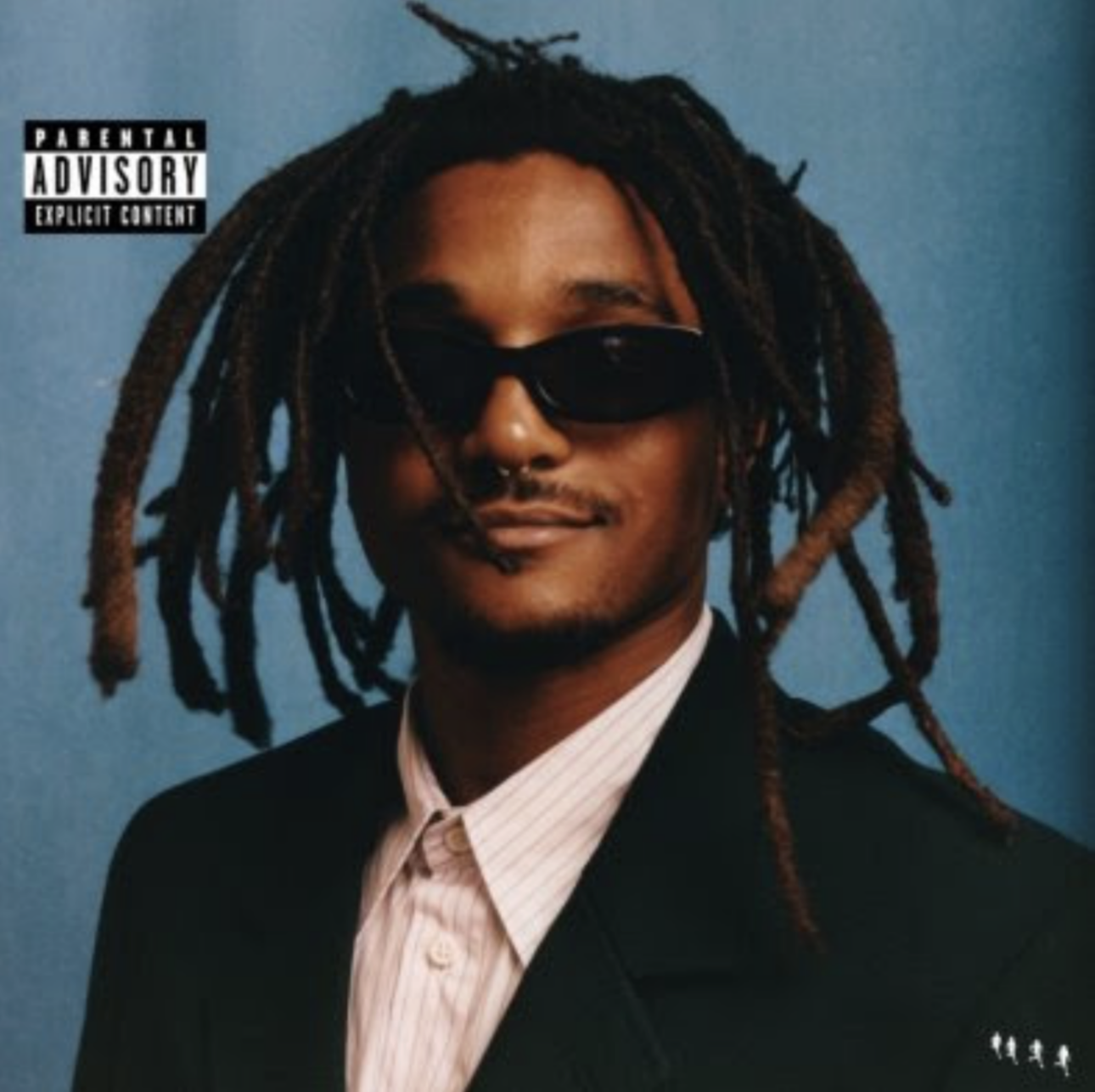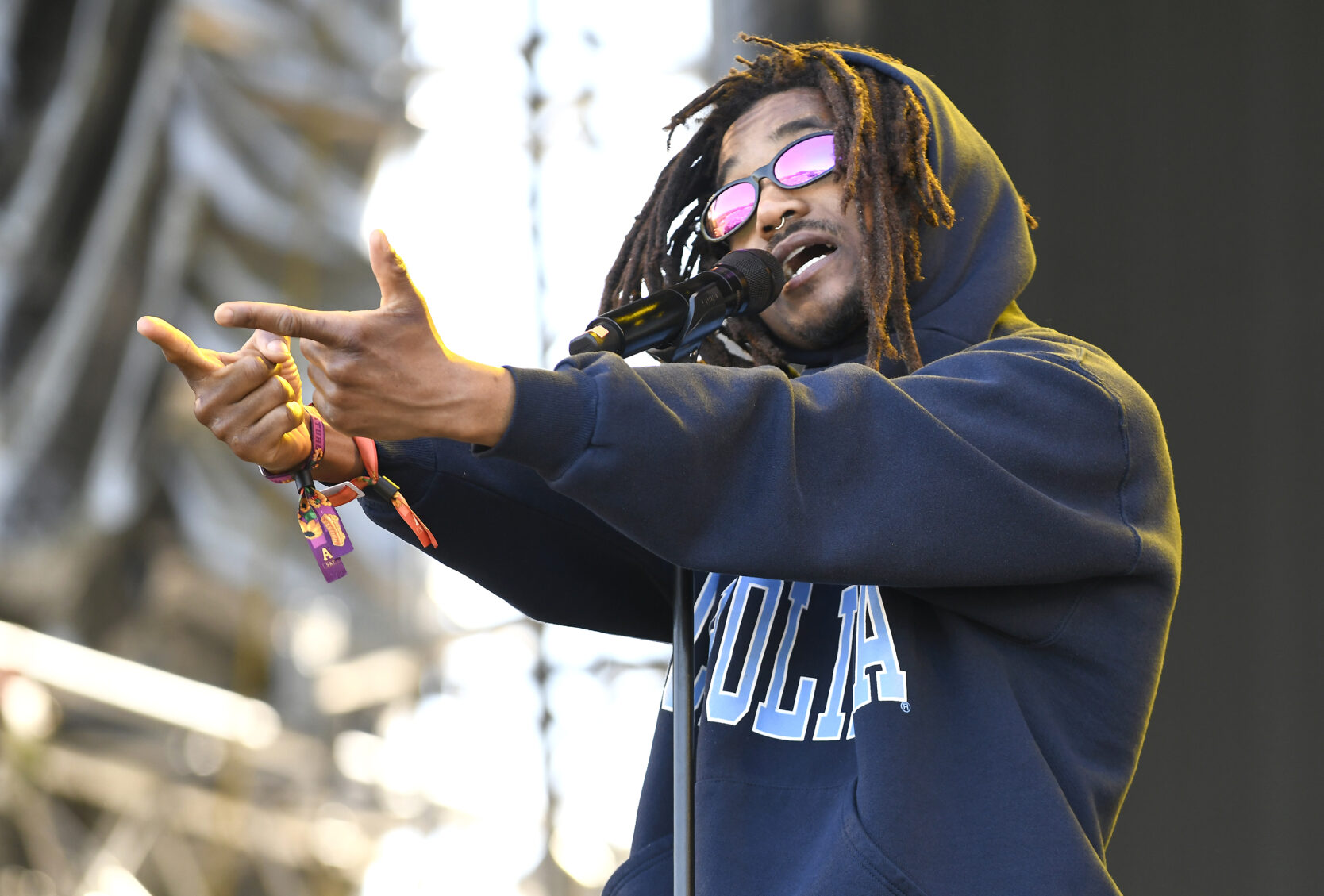Jordan Ward is from St. Louis, Missouri – or Missoura, depending on where you’re from. But today, in the back of a Suburban prowling down a sun-drenched stretch of Kent Ave. in Williamsburg, Brooklyn, he sounds nothing like it. “We ‘bout to, namsayin’, ‘bout to hit these streets and see what’s the vibes, yah’mean.” Doors open for the sold-out New York stop of his first-ever headlining tour, Tourward, in roughly three hours, and his schedule permits a quick detour for an impromptu fitting with his stylist. En route, Ward doesn’t miss his chance to cosplay the locals. “No, I’m deadass serious.” Ward’s grandmother was a student at Brooklyn’s once-notorious Boys and Girls High School. Everything is starting to make sense. Minutes later, he transitions from impersonating a Bed-Stuy native to an impromptu freestyle that his videographer is dutifully capturing. A few streetlights later, his do-it-all DJ, creative director, and friend Kato is explaining how much creative energy goes into every Jordan Ward experience, from merch to the synchronized dances Kato and Ward launch into on stage.
“They’ve got to pay you more,” I say jokingly to Kato, who graciously shrugs off the notion. Ward steps in to clarify. “They’ve got to pay us more.”
“The thing about it is,” he elaborates, “we’d be doing this if there was no money in it at all.”
Jordan Ward has an energy brewing inside of him, and an insatiable desire to convey it to the world. He packaged a great deal of this energy into FORWARD, his debut studio album released in March, which quickly accelerated Ward from bubbling under “artist of the future,” to an obvious candidate for near-immediate stardom. The album, at 14 tracks and 31 minutes, is a succinct introduction to the 28-year-old’s artistry, which is driven by R&B but inclusive of much more. With his raspy, mellifluous delivery, Ward is convincing in each lane he cruises down, whether it’s riding the acoustics of “Bussdown,” sounding very much like the alt-pop descendant of Frank Ocean’s Blonde era, or gliding through what has become his signature track, the Ryan Trey-assisted “White Crocs,” which could easily (and respectfully) be mistaken for a rap song. He broods, croons, and bops, and doesn’t appear to favor one method over the other. The moment is what dictates. The day after his show, when I ask him to clarify what led to the now-infamous opening couplet of “White Crocs”—”Just opened up my phone, and it said it needs space / So I hopped on the 405, and I’m speed racing”—he describes the very scene that the lyric conjures. It happened, so he wrote it down.
At Ward’s fitting in Brooklyn, it’s genuinely hard to tell exactly what’s going on. He and his manager, Eddie, have secured the rights to a friend’s Kent Avenue apartment for the occasion, but there’s no stylist in sight. Beers are cracked, feet are kicked up, weed is produced and crushed on arrival, and despite the close proximity to tonight’s venue’s doors opening, Ward is serene and composed. His thick and manicured dreadlocks are chaotically arranged around his head, not much unlike the image that covers his debut album. The gravelly tone of his voice makes everything feel like it’s barely above a whisper, but he rarely needs to repeat himself. He bears a welcoming presence, but there’s an unmistakable insular element to his demeanor.
“My mom got the Janet Jackson Discipline album, and there was a behind-the-scenes DVD. And I used to watch it every single day. It just had so many iconic dancers in there, and it shows the rehearsal process. They show up in all black…” It’s the day after the show, and Ward is flanked by his publicist, management team, and close confidantes on Cinco de Mayo in Greenpoint. Our taco den of choice: a Frida Kahlo-themed taqueria named Friducha. When Ward takes his position at the seat across from me, a portrait of Kahlo Mahershala Ali in front of Biggie’s crown on Luke Cage. When I point this out to Ward, he cranes his neck to observe the artwork, then swivels back to me with a simple affirmation: “Fuuuuucks.”
St. Louis, as Ward describes it, despite its rich legacy as a Midwestern American landmark, isn’t necessarily known as a trampoline into the national hip-hop scene. Despite its early 2000s glory days, when Nelly and Chingy took turns releasing platinum hits, St. Louis doesn’t have an infrastructure to push its native prodigies towards mainstream success. Jordan, like many of his peers, eventually opted to be based in Los Angeles to potentially get noticed on a grander scale. Find your thing, move to a city like L.A., and double-down. Like most things, it’s easier said than done. “When I moved to L.A., shit, it didn’t happen right away. I was working at Macy’s and Abercrombie, you feel me,” Ward says. “It took some time. My mom was like, ‘You’re moving to L.A. with $35?’” Ward remembers, looking wistfully at a plate of nachos.

The route that followed would be more than enough to write home about. Much more. Ward’s networking and ability opened doors for him that led to unimaginable opportunities. His dance crew touring history reads like an invitee list for the Grammy Awards. Justin Bieber. Beyoncé. Usher. His inspiration, Janet Jackson. Ironically, the downtime that came with touring the world opened the door Ward was ultimately meant to walk through. “We were on the Bieber tour, in our off time we’d be in the hotel room smoking, making beats on the Ableton. I would just be freestyling for fun. That turned into, ‘Hmm, I’m in a room by myself, let me write a rap real quick’.” It was the beginning of something. Ward didn’t exactly know what, but he was keen to find out. “Then it was like, ‘I’m finna be in Europe, I think I want to make a tape, let me record some shit.’ And then I got some recording equipment, and for the next three months while we were in Europe, instead of just going out to every city like I was in the months before, I started spending more time staying in. Recording myself. Being in Garageband.” Ward is staring off into the distance, as if he’s visualizing the early days of his music career. “Me and [producer Ru AREYOU] went into a store in Berlin and got a microphone. I had my MacBook, I’d go on YouTube and get instrumentals and type beats. Ru started feeding me beats. My friends put me onto Soulection.” Ward pauses for a minute here as he trails off.
“It’s not like I’m some visionary or anything. But I always knew what I wanted,” he says.
This was far from a Cinderella story, though. Ward’s musical tinkering and exploration overseas resulted in a mixtape, A Peak at the Summit, that he wanted to work. He needed videos for every song, he needed to raise awareness, and he needed to get better. He also needed a place to live. “It’s crazy because when I got off tour, I was saving to buy a house. So I’m sleeping on my boy Angelo’s couch,” Ward says. “If you watch my first video, I’m literally waking up on his couch.” Go ahead, hit YouTube, and turn on Ward’s video for “Tapas.” Angelo’s couch is one of its first co-stars. Despite the video’s lean backdrop, “Tapas” is a crash course in Jordan Ward’s obvious raw ability. Though it’s more rap-oriented than his present-day work, when he transitions into singing the song’s chorus, your heart skips a beat: “A lot of hating n*ggas want to top us / That’s ‘cause we speeding and they moving slow-mo.” Ward isn’t breaking any sound barriers by any means. But his ability to instantly wrap the character of his voice around a melody at any moment is a major reason why he’s in Greenpoint with me today.
His support system is another. Upon returning to Los Angeles, Ward immersed himself into the city’s underground music scene, traveling from showcase to showcase with a collective of like-minded peers called Awesome Awesome Shit (AAS). “It was very Odd Future, AWGE, and A$AP-inspired. If we had 50 people available, there were 50 people pulling up to every backyard show. If it was 10, they pulled up to every weed shop show or session. It just grew,” he says.
Eventually, Ward’s name began ringing bells outside of the world he’d built with the help of AAS. Dance crew staffers continued to call his phone, but he continued to have other ideas of where he could take his career. Ward’s management team would introduce him to No I.D., who took an interest in Ward and mentored him to release his head-turning 2019 album Valley Hopefuls. In fact, it’s No I.D. to you and me, but “Dion” to Ward, which Ward says several times as he recalls being taken under the wing of one of the most revered producers of his generation. Ward remembers a specific conversation with “Dion” that helped force his hand. “He’s telling me, ‘I’m about to go to New York for the Grammys with Jay-Z and 4:44. What are you doing today?’” It was becoming clearer and clearer that Ward would have to choose a path.
That path led him to FORWARD, and moreward(FORWARD), the deluxe edition of Ward’s celebrated debut, released on August 25. On it, he collaborates with 6lack, one of the premiere acts in the alt-R&B and alt-pop space. When asked about it, Ward is excited about the headway he’s making there, but warns against categorizing his career just yet. “I don’t know if I’d say I’m at the forefront [of the alt-R&B movement], but I definitely wanna keep experimenting and having fun with the music, regardless of what genre it’s classified as.”
It’s unlikely that he names his next project Up, but that seems to be the only direction left to travel.




